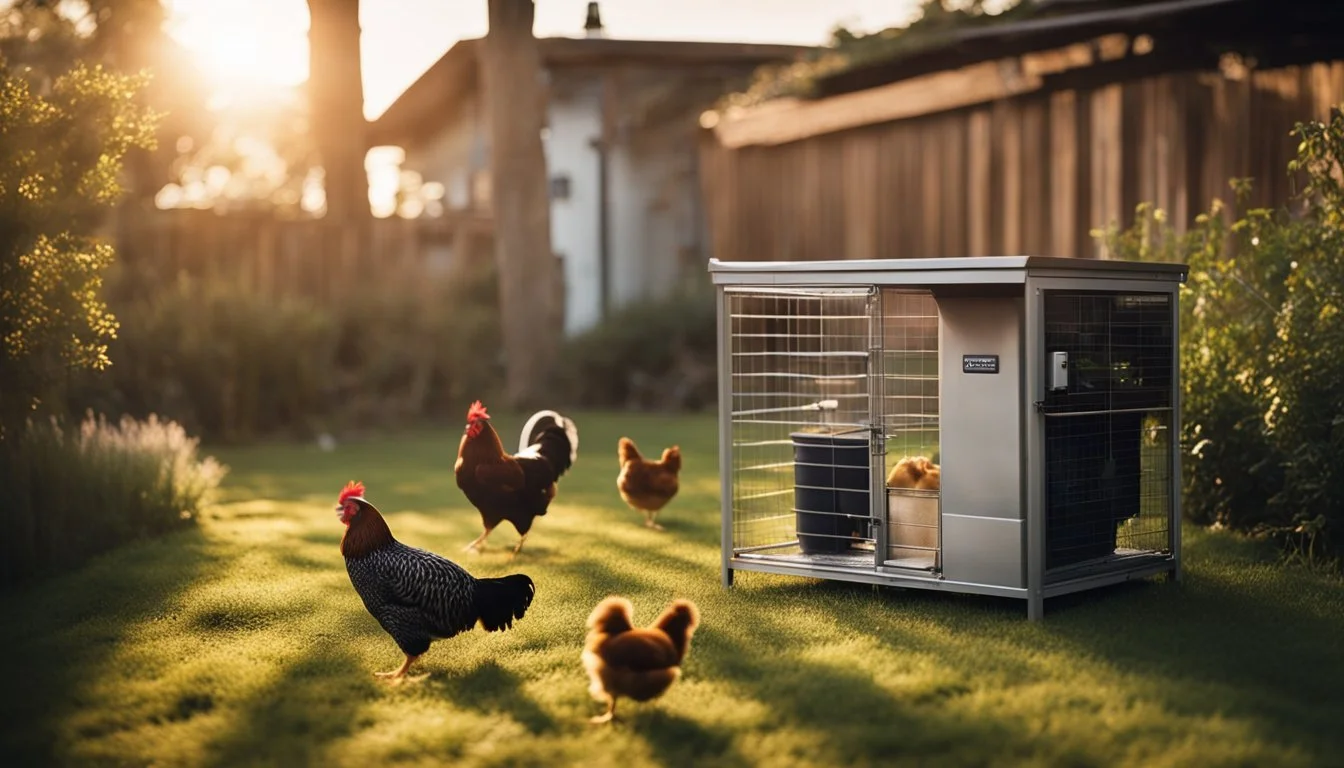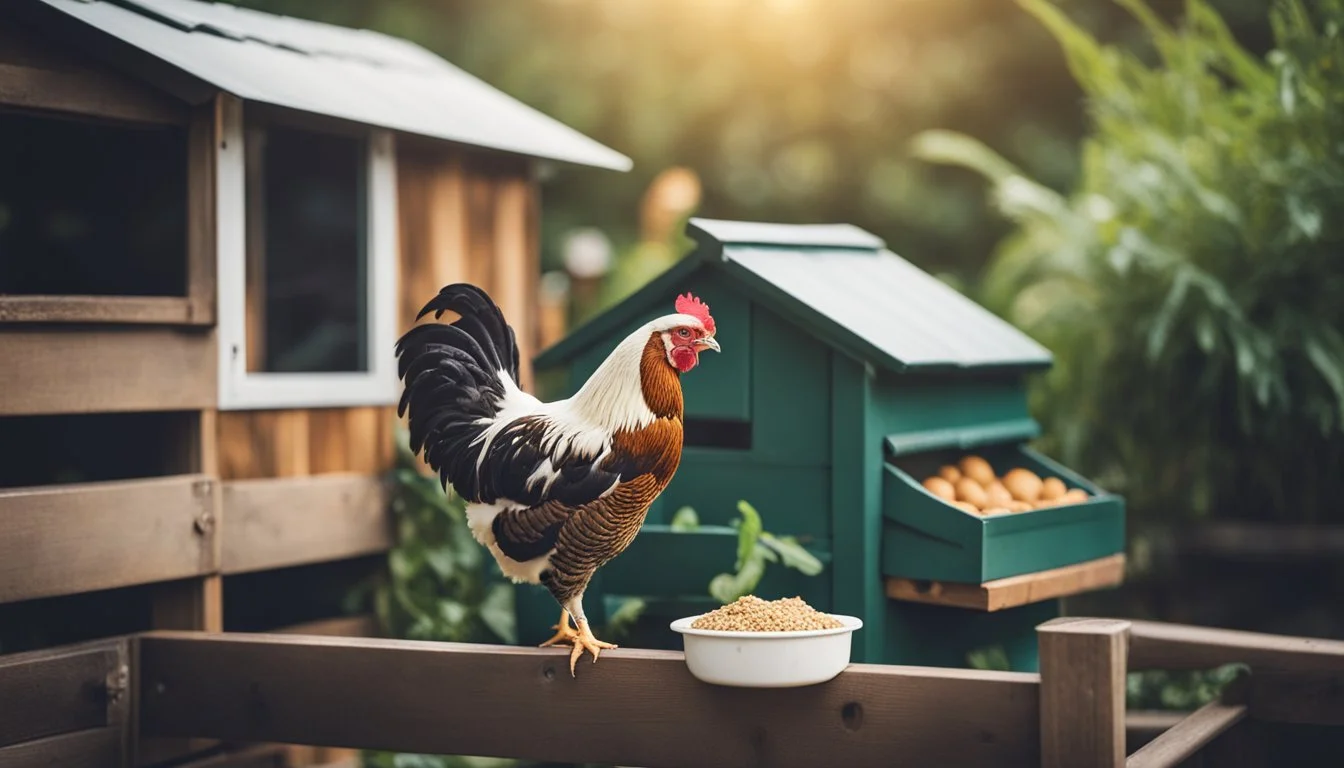7 Tips for Raising Chickens in a Small Apartment
A Practical Guide
Raising chickens in a small apartment might seem like a daunting task, but with the right strategies, it can be a rewarding and manageable endeavor. For apartment dwellers wanting to enjoy fresh eggs and the companionship of chickens, there are several key considerations to keep in mind.
Understanding how to create a proper living space for your chickens within the confines of an apartment is crucial to their health and well-being. This article provides valuable tips and advice to help you successfully maintain a small flock in an urban environment while ensuring the comfort and happiness of both you and your feathered friends.
1) Choose Bantam Breeds
Bantam chickens are ideal for small apartment spaces due to their smaller size compared to standard chickens. They require less room and are easier to manage in confined areas.
Popular bantam breeds include the Silkie Bantam, known for its fluffy, silk-like feathers, and the Cochin Bantam, which has a friendly temperament. These breeds are not only manageable but also add visual appeal to your living space.
Bantams lay smaller eggs with a richer yolk to white ratio. It takes 3-4 bantam eggs to match 2 standard chicken eggs. This can be a great benefit in culinary uses, adding more flavor to your dishes.
When choosing bantam breeds, consider their lifespan, which generally ranges from 4-8 years. While they may live shorter lives than standard chickens, their compact size and unique characteristics make them suitable for apartment living.
Additionally, bantams thrive on a balanced diet of grains, seeds, vegetables, and insects. Their smaller size means they consume less food, making them more economical to keep.
In a small space, hygiene is crucial. Bantams, being smaller, produce less waste, making it easier to maintain a clean environment. Keeping a clean living space is essential for preventing health issues.
By selecting bantam breeds, apartment dwellers can enjoy the joys of chicken keeping without the space constraints typically associated with raising poultry.
2) Use Multi-Level Perches
Using multi-level perches can maximize the vertical space of a small apartment. Chickens naturally prefer to roost at higher elevations, making perches a great fit for tight quarters. Providing perches at varying heights gives chickens a sense of security and comfort.
Ensure the perches range from 1.5 to 4 feet off the ground. This height accommodates chickens’ roosting behavior without taking up excessive space. Different levels also allow birds to choose their preferred height, which can reduce stress.
The perches should be about 2 to 5 inches wide. This size helps chickens comfortably grip the perch and stay balanced throughout the night. Make sure to place perches away from nesting boxes to prevent chickens from roosting where they lay eggs.
Multi-level perches support the birds' natural behaviors and contribute to their overall well-being. Additionally, this setup can reduce conflicts among chickens, as they can space themselves out vertically. Properly designed perches help create a more harmonious living environment, even in a small apartment.
3) Optimize space with vertical feeders
Vertical feeders are an excellent way to maximize the limited space in a small apartment. By using vertical feeders, chicken owners can keep the feeding area tidy and ensure that their birds have constant access to food without taking up valuable floor space.
Most vertical feeders are designed to hang from the ceiling or attach to the walls of the coop. This setup allows chickens easy access to food while reducing spillage and waste.
Additionally, vertical feeders can hold a substantial amount of feed, minimizing the need for frequent refilling. Many models can be adjusted to control the flow of feed, ensuring a steady supply.
These feeders can be made from various materials, including plastic and metal, and are often designed to be easy to clean. Choosing a durable and weather-resistant material will ensure longevity.
For those who enjoy DIY projects, creating a vertical feeder from PVC pipes or other materials can be a cost-effective and customizable solution.
4) Maintain Proper Ventilation
Proper ventilation is key for a healthy chicken environment in a small apartment. Without it, ammonia from chicken droppings can build up, causing respiratory issues for the birds.
Ensure air flows freely to control temperature and humidity. Ventilation helps remove moisture, carbon dioxide, and unwanted odors.
Avoid direct drafts that could chill the chickens, especially near their roosting area. Using windows, vents, or fans can improve air circulation without causing discomfort.
In colder months, some ventilation openings might need to be partially closed to retain warmth. However, never compromise an adequate air exchange to prevent harmful gas accumulation.
5) Ensure Regular Cleaning
Regular cleaning is crucial for raising chickens in a small apartment. A clean living space helps maintain the health and well-being of the chickens. It prevents the buildup of harmful bacteria and reduces the risk of illness.
Check the coop daily for any droppings or spills. Spot-clean any messes as they occur. This will keep the environment fresh and reduce odors.
Perform a thorough cleaning at least once a week. Replace bedding material and disinfect surfaces. This routine helps prevent disease and keeps the area sanitary.
Proper ventilation also plays a key role in maintaining a clean space. Ensure the coop has good airflow to minimize moisture and reduce the risk of respiratory issues.
Handling waste properly is vital. Remove and dispose of droppings in an appropriate manner to avoid unpleasant odors and potential health hazards.
By staying consistent with cleaning, apartment chicken owners can create a healthy and pleasant environment for their pets.
6) Use Odor Control Methods
Managing odors is crucial when raising chickens in a small apartment. Start by regularly cleaning the bedding and removing droppings daily. This prevents the accumulation of waste, which is a primary source of foul smells. Use a small shovel or scoop to make this task easier.
Ventilation plays a key role in odor control. Ensure the chicken enclosure has adequate airflow to reduce humidity and disperse unpleasant odors. Fans or air purifiers can help maintain a fresh environment.
Incorporate natural odor absorbers like baking soda. Sprinkle some baking soda on the floor of the enclosure before adding fresh bedding. Its properties help to neutralize odors effectively.
Feed the chickens in a way that reduces food spillage. Leftover feed can rot and contribute to bad smells. Offer food in portions they can consume at one time, using feeders that minimize scattering of food on the ground.
Moisture control is essential. Wet bedding can lead to the formation of ammonia from chicken poop, which produces a strong, unpleasant odor. Keep the bedding dry to prevent this issue.
7) Provide Artificial Lighting
Artificial lighting is crucial for chickens kept in a small apartment. Chickens need a consistent light schedule to lay eggs regularly. Aim to provide 14-16 hours of light each day, with 8-10 hours of darkness. This mimics natural daylight patterns and supports their biological rhythms.
LED lights are an energy-efficient and long-lasting option. They provide bright, stable light, which is ideal for indoor chicken coops. If electricity is a concern, solar lighting can be an effective alternative, reducing utility costs while maintaining proper lighting conditions.
Setting lights on a timer can simulate an "artificial sunrise". This helps the chickens gradually wake up and prepare for roosting. Ensure the lighting setup avoids sudden darkness, which can stress the birds. Adjusting the timer to match their natural waking and roosting times is beneficial.
Necessary Supplies for Urban Chicken Keeping
Proper supplies are critical for successfully raising chickens in an urban environment. This includes selecting the appropriate breed and ensuring the housing setup meets all the needs of the chickens.
Choosing the Right Breed
When choosing the right breed for urban chicken keeping, it's essential to consider space constraints, noise levels, and egg production. Bantam chickens are a great choice due to their smaller size and quieter nature. Silkies and Cochins are popular bantam breeds known for their friendly temperament.
For those wanting larger breeds, Australorps and Orpingtons are suitable as they are relatively quiet and prolific layers. Research each breed's characteristics and match them to your living situation. Consulting other urban chicken keepers or local resources can provide valuable insights into breed selection.
Essential Housing Requirements
The coop needs to be spacious enough to allow for natural behaviors such as perching, nesting, and dust bathing. As a guideline, ensure at least 2-3 square feet per chicken inside the coop and an additional 8-10 square feet in the run.
Construction Materials: Use durable, weather-resistant materials to build or purchase a coop. Wood is a common choice, but ensure it is treated to withstand urban weather conditions.
Ventilation: Proper ventilation is crucial to prevent moisture buildup and ammonia from waste, which can lead to respiratory problems. Install vents or windows that can be opened and closed as needed.
Cleanliness: Include easily cleanable surfaces and removable trays that can be regularly sanitized. Installing a litter system, such as sand or pine shavings, helps manage droppings and maintain hygiene.
Additional Supplies
In addition to the coop, other essential supplies include a brooder for chicks, feeders, waterers, and a heat lamp if needed. Consider automatic feeders and waterers for convenience. All equipment should be easy to clean and maintain, contributing to the overall health and comfort of the chickens.
Maintaining Hygiene and Health
Proper hygiene and health practices are crucial when raising chickens in a small apartment. This ensures the well-being and comfort of the chickens, as well as the cleanliness and safety of the living environment.
Regular Cleaning Practices
Regular cleaning of the chicken coop and living area is essential. Daily spot cleaning should include removing droppings and replacing soiled bedding. Weekly deep cleaning involves scrubbing and disinfecting surfaces, feeders, and waterers.
Using materials that are easy to clean and sturdy scrub brushes can help. Sand can be a useful bedding option, as it is easier to clean compared to straw or wood shavings. Ensure bedding is dry and free from mold to prevent respiratory issues.
Preventing Common Diseases
Regular health checks are a must. Look for signs of common diseases such as mites, lice, and respiratory infections. Maintaining a clean living environment helps in disease prevention.
Vaccination and deworming schedules should be strictly followed. Isolate any sick chickens to prevent spreading illnesses to others. Providing a balanced diet with proper nutrients and ensuring fresh water supply is key. Adding natural supplements like garlic or apple cider vinegar to water can boost their immune system.
Noise and Neighbor Considerations
Living in a small apartment with chickens requires careful attention to noise control and maintaining good relationships with neighbors. Balancing these aspects can ensure a harmonious living environment.
Soundproofing Tips
Effective soundproofing is essential to keep chicken noises to a minimum. Consider using soundproof curtains or blankets around the coop area to absorb sounds.
Installing weatherstripping on doors and windows can seal gaps where noise might escape. Covering coop walls with foam panels can further dampen sounds effectively.
Rugs and carpets in the apartment help to absorb noise produced by chickens scratching on the floor. Opt for egg-laying breeds known for being quieter, which minimizes disturbances.
Friendly Neighbor Relations
Building good relationships with neighbors can prevent complaints regarding chicken noise. Initiate open dialogue by informing neighbors about your decision to keep chickens and address any concerns they may have.
Offering neighbors some fresh eggs occasionally can help build goodwill. Maintaining cleanliness of the living area and managing odors are crucial in preventing resentment.
Setting a specific time to let your chickens out for exercise and ensuring they are indoors during quiet hours can further alleviate potential issues.












